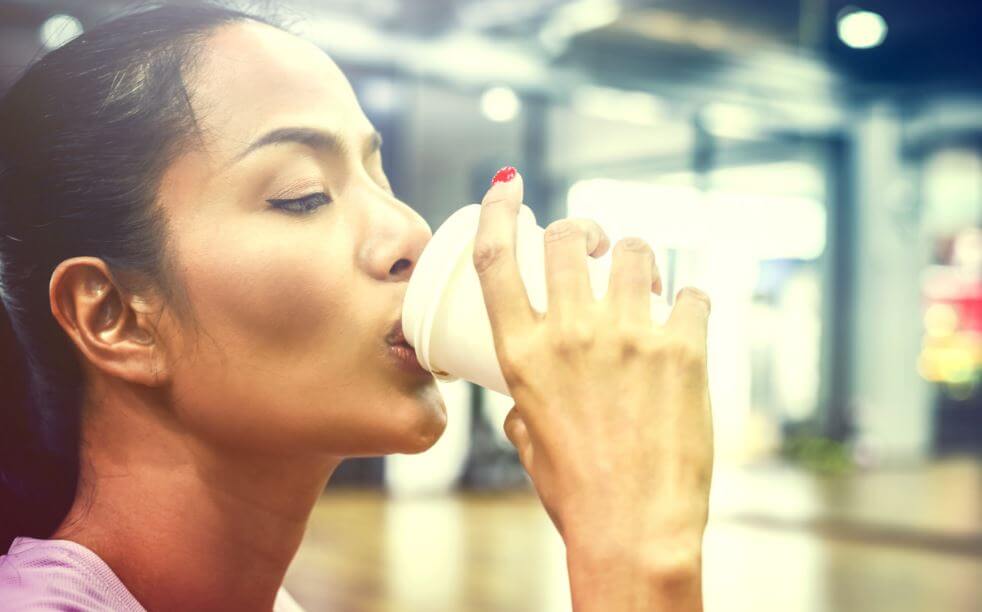Caffeine and Sports

Drinking coffee to help you study or work at night is a generally accepted habit. However, did you know that caffeine also stimulates the body, not only the mind? Believe it or not, there’s room for caffeine in sports.
Awakening the body
Coffee has a stimulating effect, we all know that having a cup of coffee can keep up awake even if we were sleepy previously. This effect occurs due to the stimulation of the nervous system.
The effects of coffee, however, do not stop with inhibiting the feeling of drowsiness. The body responds to nerve endings being stimulated, this means that the body becomes more alert and this improves response time.

As a result of this stimulation, performance in sports can be improved. If we analyze it carefully, it can be said that coffee can help an athlete respond faster to stimuli. In addition, caffeine can awaken and help improve endurance.
Cells and caffeine
The effectiveness of caffeine is immediate and this is due to its ability to be absorbed quickly by the body. After it’s absorbed, the substance is rapidly distributed to all of the body’s cells. Just one hour after caffeine intake, its levels begin to increase within the bloodstream.
If you observe carefully, you can see that some athletes complement their breakfast with a coffee or a chocolate drink. This is all about taking advantage of the benefits of caffeine.
The relationship between caffeine and our metabolic processes are well known. Caffeine ingestion increases heart rate and output. It also increases the temperature of the body which promotes burning calories.
Therefore, it can be said that coffee does more than stimulate, to some extent it’s also involved in toning muscles. There are still a lot of studies necessary to fully understand the relationship between physical activity and caffeine. What is certain however, is that caffeine causes dependence.
Caffeine and sports: ergogenic help
Here are a few ways that caffeine produces an increase in athletic performance:
- Caffeine increases the metabolism of exogenous carbohydrates: this contributes to burning leftover calories. Muscle toning is also favored to a certain extent due to this effect.
- It increases the oxidation of fatty acids: this means that it increases the speed of metabolism and fat burning. This is another plus when it comes to building muscle.
- Caffeine increases adrenaline levels: caffeine intake can improve immediate response time, it also plays a role in overcoming fatigue.
- Caffeine decreases interstitial potassium: this effect happens in the muscles and it can delay the feeling of fatigue. As a result, efficiency and resistance are improved.

Caffeine also has negative side effects
Controlled consumption of caffeine in sports should not cause any major problems. In fact, coffee and chocolate drinks have become very popular in our culture. However, keep in mind that excess is always bad. Let us start from the unquestionable reality which is that caffeine causes dependence.
Dizziness, digestive problems, increased blood pressure, and gastrointestinal pain are among some other effects of excessive caffeine consumption. Other side effects include headaches and motor deficiency which is detrimental to both intellectual and physical activities.
In the long run, however, there are contradicting opinions about the relationship between physical activities and caffeine. We must also point out that each individual is unique and that caffeine may not affect everyone in the same way.
Caffeine in sports: how much can you consume?
It all depends on your own body. An intake of 100mg may be sufficient for individuals who are not accustomed to coffee. This small amount would be enough to make them feel active and alert.
In most cases, the recommended amount is about 4 to 8 mg for every kg of weight. The decision to use caffeine while training is up to each athlete.
Drinking coffee to help you study or work at night is a generally accepted habit. However, did you know that caffeine also stimulates the body, not only the mind? Believe it or not, there’s room for caffeine in sports.
Awakening the body
Coffee has a stimulating effect, we all know that having a cup of coffee can keep up awake even if we were sleepy previously. This effect occurs due to the stimulation of the nervous system.
The effects of coffee, however, do not stop with inhibiting the feeling of drowsiness. The body responds to nerve endings being stimulated, this means that the body becomes more alert and this improves response time.

As a result of this stimulation, performance in sports can be improved. If we analyze it carefully, it can be said that coffee can help an athlete respond faster to stimuli. In addition, caffeine can awaken and help improve endurance.
Cells and caffeine
The effectiveness of caffeine is immediate and this is due to its ability to be absorbed quickly by the body. After it’s absorbed, the substance is rapidly distributed to all of the body’s cells. Just one hour after caffeine intake, its levels begin to increase within the bloodstream.
If you observe carefully, you can see that some athletes complement their breakfast with a coffee or a chocolate drink. This is all about taking advantage of the benefits of caffeine.
The relationship between caffeine and our metabolic processes are well known. Caffeine ingestion increases heart rate and output. It also increases the temperature of the body which promotes burning calories.
Therefore, it can be said that coffee does more than stimulate, to some extent it’s also involved in toning muscles. There are still a lot of studies necessary to fully understand the relationship between physical activity and caffeine. What is certain however, is that caffeine causes dependence.
Caffeine and sports: ergogenic help
Here are a few ways that caffeine produces an increase in athletic performance:
- Caffeine increases the metabolism of exogenous carbohydrates: this contributes to burning leftover calories. Muscle toning is also favored to a certain extent due to this effect.
- It increases the oxidation of fatty acids: this means that it increases the speed of metabolism and fat burning. This is another plus when it comes to building muscle.
- Caffeine increases adrenaline levels: caffeine intake can improve immediate response time, it also plays a role in overcoming fatigue.
- Caffeine decreases interstitial potassium: this effect happens in the muscles and it can delay the feeling of fatigue. As a result, efficiency and resistance are improved.

Caffeine also has negative side effects
Controlled consumption of caffeine in sports should not cause any major problems. In fact, coffee and chocolate drinks have become very popular in our culture. However, keep in mind that excess is always bad. Let us start from the unquestionable reality which is that caffeine causes dependence.
Dizziness, digestive problems, increased blood pressure, and gastrointestinal pain are among some other effects of excessive caffeine consumption. Other side effects include headaches and motor deficiency which is detrimental to both intellectual and physical activities.
In the long run, however, there are contradicting opinions about the relationship between physical activities and caffeine. We must also point out that each individual is unique and that caffeine may not affect everyone in the same way.
Caffeine in sports: how much can you consume?
It all depends on your own body. An intake of 100mg may be sufficient for individuals who are not accustomed to coffee. This small amount would be enough to make them feel active and alert.
In most cases, the recommended amount is about 4 to 8 mg for every kg of weight. The decision to use caffeine while training is up to each athlete.
All cited sources were thoroughly reviewed by our team to ensure their quality, reliability, currency, and validity. The bibliography of this article was considered reliable and of academic or scientific accuracy.
[featured-post url=”https://fitpeople.com/health/the-effects-of-marijuana-on-the-body/”]
- Devaki, P. R., Renukadevi, M. R., & Saikumar, P. (2012). Influence of coffee drinking on cardiovascular response during physical and mental stress. Biomedicine (India).
This text is provided for informational purposes only and does not replace consultation with a professional. If in doubt, consult your specialist.








